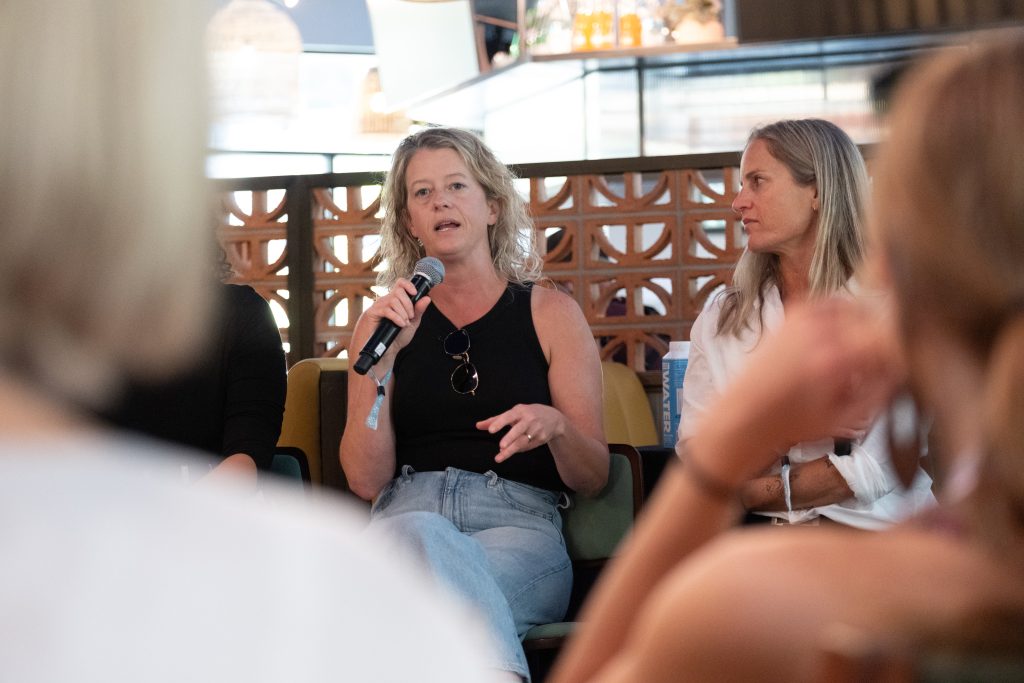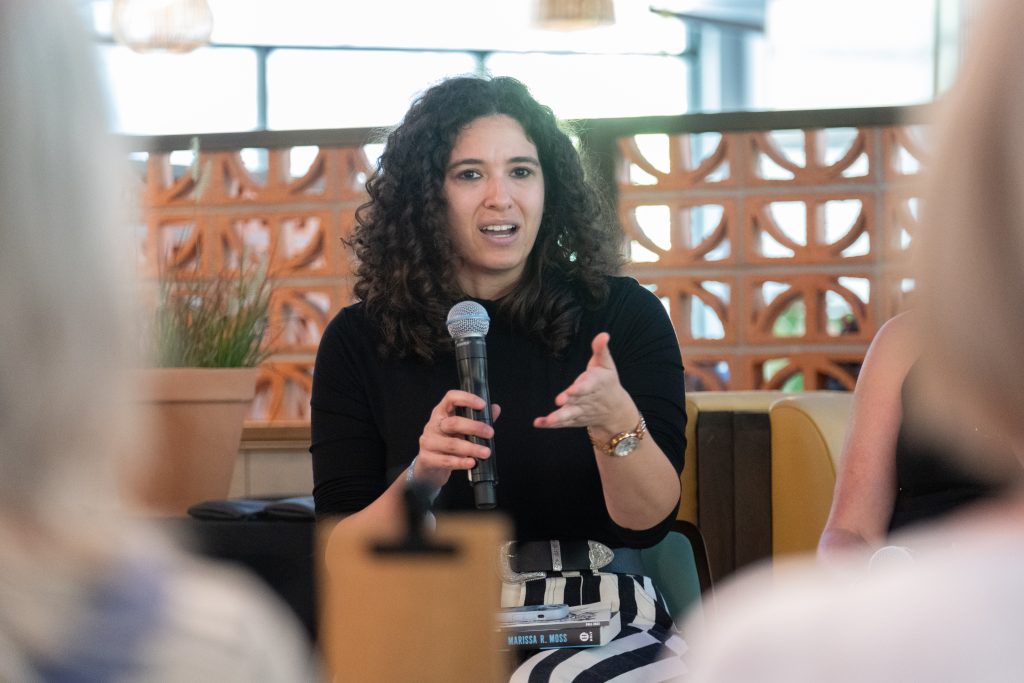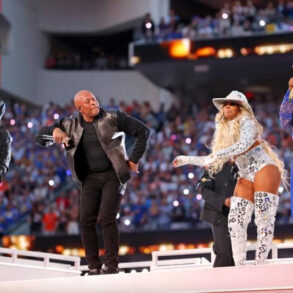
One of Park City Song Summit‘s focuses is self-care and artist wellness, but it also wants to look behind the scenes and see how artists’ managers and promoters find the time to keep healthy.
And, more specifically, how does being a woman figure in the equation?
Hilary Saunders, managing editor at No Depression, a quarterly roots music journal, addressed these and other questions during the “Power Women in the Industry” lab that was held Thursday afternoon at Dos Olas restaurant at Canyon Village.
Saunders moderated the discussion, after award-winning music journalist and author Marissa R. Moss came down with COVID-19, and picked the brains of Lenore Kinder, senior vice president of Wasserman Music, and Emily Lichter, founder of Public Emily, an artist management firm.
Lichter’s company manages artists such as two-time Grammy winner Rickie Lee Jones, Late Show with Stephen Colbert‘s Music Director Louis Cato, Sarah Jarosz and Lake Street Drive, to name a few.
Kinder, through Wasserman, represents music, sports, brands and properties. The roster includes Sigur Ros, Tanya Tucker and Lucie Silvas.
After introductions and a brief discussion about management, Saunders posed the question:
What defines power in this industry, especially as a woman?
“I think power is an illusion,” Kinder said. “The minute you realize you’re not in control is terrifying at first. But there’s a lot of freedom in that.”
Kinder also said the “real meaning of power is more like the power of being kind, doing good work and sticking with your principles, and not doing something for the wrong reasons.”
Lichter referred to her firm as a statement of power.
“For me, personally, my own empowerment is that I’ve run my own business since 2001,” she said. “That, in one way, feels powerful, because I work for myself.”

Lichter said working for herself is filled with challenges, one of which is not being recognized as a business owner in the industry because she is a woman.
“(So) it’s amazing to be respected and asked to do this panel, because there are very few times I’ve chosen to speak out, even though I’ve run my own business for 22 years and manage who I think are very successful artists,” she said. “I will also say the fact that there’s something still called ‘women in the industry’ is deflating. We still differentiate that from just saying ‘powerful people.’”
Challenges aside, Lichter always knew she wanted to work for herself.
“I really have a hard time with other people telling me what to do,” she said with a laugh. “I also have a hard time aligning with other people’s needs if I don’t agree with them.”
One of Lichter’s business influences is singer-songwriter Ani DiFranco, who is also the founder of Righteous Babe Records.
“When I dropped out of college, I was really enamored with Ani DiFranco, not just her music, but what she created by building her own business,” Lichter said. “So when I was 22 years old, I knew that’s what I wanted to do. And I knew there was a way and place for me to build my own path.”
Lichter wanted the path to lead her to representing artists.
“I always knew this is what I was going to do, and I took jobs in New York in order to learn,” she said. “I learned the system to defeat the system.”

The secret to Lichter’s success was staying true to what she believed.
“I kept doing what felt right for me and what felt right for the artists I worked with,” she said.
One of the artists who benefited from Lichter’s principles was Lake Street Drive.
“When I first met (the band), they were playing in New York for 30 people in a tiny little club, passing a hat for tips,” she said. “The next year they were headlining Madison Square Garden. In the past 12 years of working with them, I got to bring all of the values I believed in and apply them to that position after 10 years of knowing that I could do this. Hopefully I haven’t peaked.”
Kinder’s road was less focused.
“I was going to be an accountant, and quickly decided I didn’t want to be an accountant,” she said. “But I decided marrying something that I was passionate about with a business would make my work more enjoyable, because I don’t know how to turn things off.”
Part of Kinder’s drive stems from being competitive and coming from an impoverished family.
“I grew up poor, so it was very important to me to be very successful,” she said. “And it was important to me to do something that felt like I was putting a little bit more into the world.”
While attending college in Knoxville, Tennessee, Kinder switched her major and interned for AC Entertainment, a music and artist promotional company.
“I was quickly fired for being too wild, and that was an eye opener,” she said. “I realized you couldn’t just go to shows and have fun. You had to do work, too.”
After graduation, Kinder cut her teeth in marketing and advanced production.
“Then I moved to Nashville, thinking they would roll out the red carpet for me,” she said.
But she couldn’t find a steady job.
“I ended up tour managing for a punk band called Be Your Own Pet, and I sold merchandise for Gilian Welch,” she said. “I ran spot ops at the Nashville Convention Center, and hung posters for really big shows. And ultimately when I couldn’t find a job, I rolled sushi at this restaurant called PM.”
Throughout the odd jobs, Kinder kept in touch with a woman who was running the regional office of AEG Presents in Nashville.
“I did some work for them part time in the marketing department, and when someone quit, she had me (working as a) marketing assistant,” Kinder said. “I told her my goal was to be a talent hire and promoter and learn how to do what she did.”
Kinder started working as a talent hire a year later, and from there, she moved on to work with Paradigm Talent Agency, where she sold shows to promoters.
After the pandemic, Kinder found herself at Wasserman.
“I help clients find guardrails if they need them,” she said.
While shouldering all of the hefty responsibility of their positions, Lichter and Kinder have found ways to self-care, which recharges their batteries.
“I left New York City and moved to the woods in Massachusetts,” Lichter said. “I spend a lot of time in the woods, and I live alone with my dog. I focus on quiet, nature, eating right and trying to sleep, and having separation from my work. That’s hard, because my work has been my entire life.”
Kinder learned the hard way that self-care is an essential part of keeping mentally and physically healthy.
“I spent the first 35 years of my life not taking care of myself at all in any particular fashion,” she said. “I would exercise, but that was from a vanity point of view to look good. Very little was about how it was making me feel.”
Things changed when Kinder met the person who would become her wife.
“Meeting my partner and deciding our relationship was more important than the output at work really helped,” she said. “I also have an incredible therapist. She saved my life. I see her every Monday, and I will not place anything over that. Because I can’t show up for other people if I’m not prioritizing myself.”







